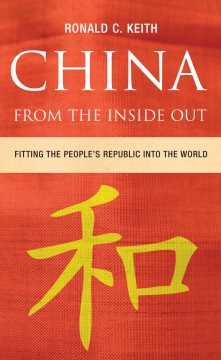
Additional Information
Book Details
Abstract
This book champions China's domestic politics, which will be essential in shaping the country's role in the world.
Many books claim to aid our understanding of China. They assume that it is destined to follow the model of the US; war, empire and unilateralism. However, China From the Inside Out highlights the China's domestic perception of it's own 'rise'.
Critically analysing Chinese policy which straddles the paradox between 'socialism' versus 'capitalism with Chinese characteristics', this book looks at the struggle to create a rule of law and foster human rights through a new stage of democratic reform.
'A sophisticated analysis of Chinese thinking on the major issues of development and foreign policy. THis book is an excellent alternative to the many clichéd, and incorrect, interpretations of CHinese political history. HIghly Recommended'
CHOICE
Table of Contents
| Section Title | Page | Action | Price |
|---|---|---|---|
| Cover | Cover | ||
| Contents | v | ||
| Acknowledgements | vii | ||
| Preface | viii | ||
| 1. Understanding China Once More | 1 | ||
| The Comparative Dilemma of ‘Wealth and Power’ | 1 | ||
| ‘Nationalism’ and ‘Cosmopolitanism’ | 7 | ||
| Mao Zedong as China’s Paradox | 11 | ||
| Containment and the Persistence of Realism | 13 | ||
| 2. Fitting the People's Republic into the World | 18 | ||
| ‘Cleaning Up the House Before Entertaining the Guests’ | 20 | ||
| Establishing the Foundations of Contemporary Foreign Policy at Bandung | 24 | ||
| The Chinese Learning Dialectic | 27 | ||
| Resolving the Outstanding Contradiction within Foreign Policy | 33 | ||
| Foreign Policy and the Cultural Revolution | 36 | ||
| Plumbing the Depths of Chinese Foreign Policy ‘Pragmatism’ | 38 | ||
| Deng Xiaoping Places China in the World | 41 | ||
| 3. Connecting the 'Rule of Law', 'Human Rights' and 'Democracy' in China | 47 | ||
| Connecting the ‘Rule of Law’, ‘Human Rights’and ‘Democracy’ | 51 | ||
| The Confucian Past in the Constitutional Present | 53 | ||
| The ‘Rule of Law’ in China? | 55 | ||
| A Chinese Human Rights Paradigm? | 65 | ||
| The Criminalization of Domestic Violence | 73 | ||
| The Dilemmas of Procedural Justice | 75 | ||
| The Prospect for ‘Democracy’ in China? | 78 | ||
| The Contradictions of Sinification | 86 | ||
| 4. ‘Socialism' or 'Capitalism with Chinese Characteristics'? | 91 | ||
| Reform Strategy | 96 | ||
| China in the ‘Primary Stage of Socialism’ | 96 | ||
| ‘Socialism’ versus ‘Capitalism’ in Tiananmen Square,1986 and 1989 | 97 | ||
| Deng’s ‘Southern Tour’ and the ‘Socialist Market’ | 102 | ||
| The Political Economy of ‘Newly Emerging Interests’ | 106 | ||
| The Hu Jintao Leadership and the Private Property Issue | 113 | ||
| The Politics of Housing Reform | 121 | ||
| 5. China's New 'Model' of International Relations | 127 | ||
| The Contemporary Relevance of ‘Harmony with Differences’ | 129 | ||
| The Maturation of Chinese Diplomacy | 138 | ||
| The New Security Concept | 139 | ||
| Development in the Era of Globalization | 141 | ||
| The Chinese Rebuttal to Realism | 142 | ||
| ‘Revisit the Past and Know New Things’ | 146 | ||
| 6. China Redux | 149 | ||
| The Learning Dialectic and the Strategy for Development | 149 | ||
| ‘Reform as Revolution’? | 153 | ||
| ‘Democratization of International Relations’ and ‘Diversity of Civilizations’ | 154 | ||
| The Learning Dialectic and Hu’s ‘Scientific Development Concept’ | 156 | ||
| The Party’s ‘Chinese Characteristics’? | 158 | ||
| Notes | 161 | ||
| Selected Concepts in Pinyin and Chinese Characters | 180 | ||
| Selected Readings by Chapter Themes | 183 | ||
| INDEX | 188 |
